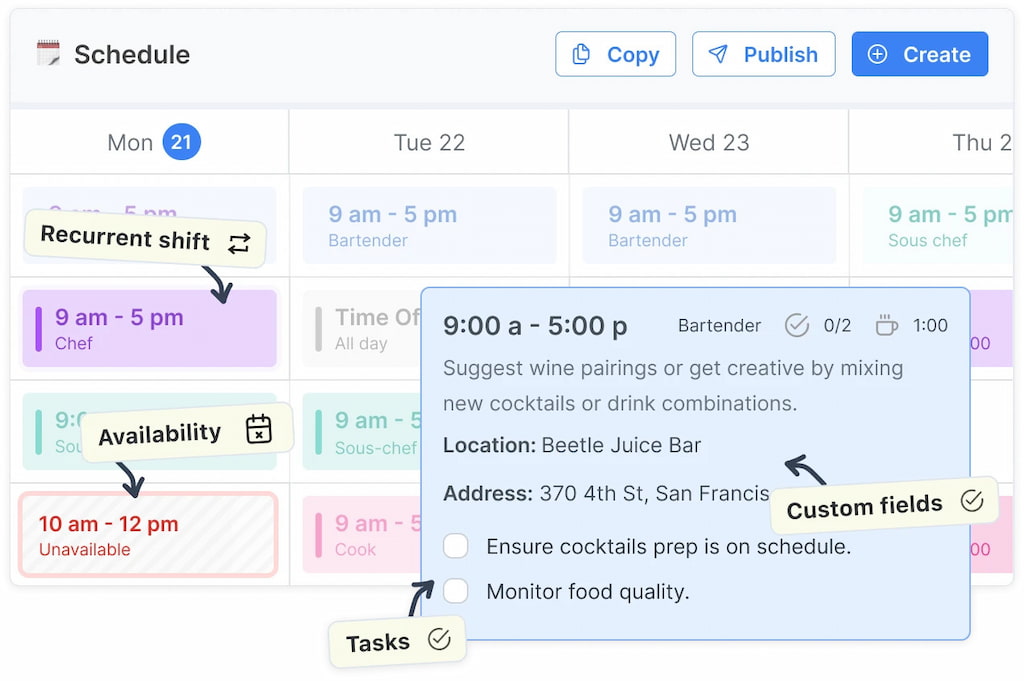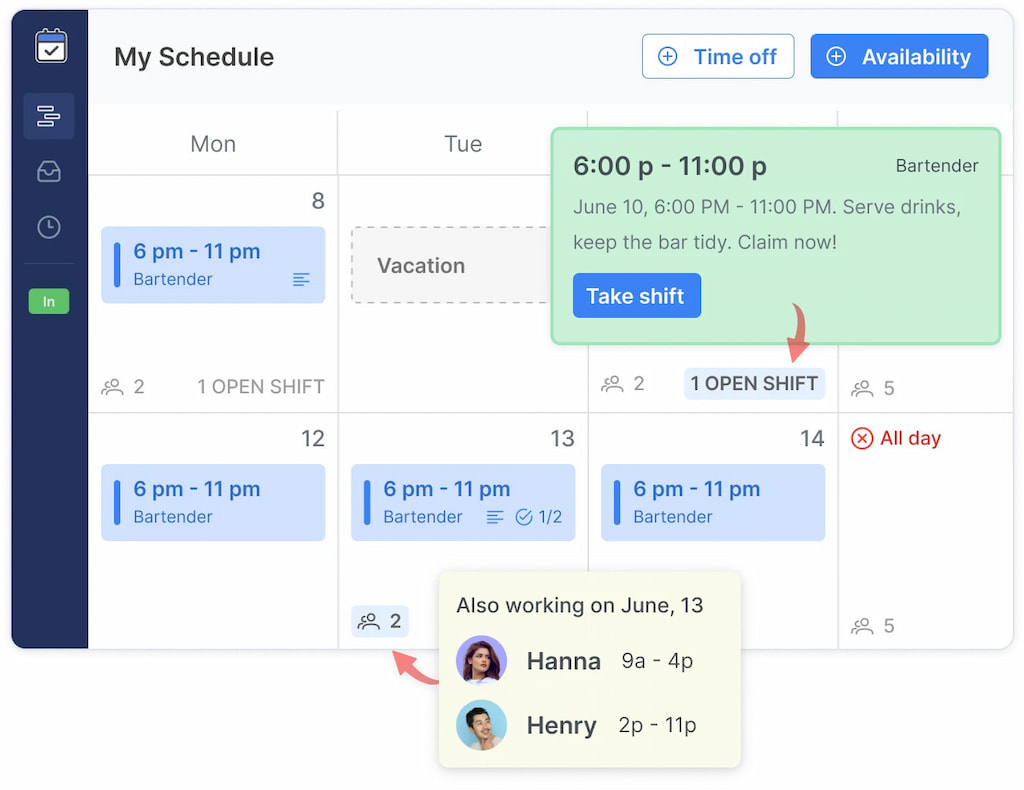It’s 3 pm on a Tuesday, and your five-agent customer support team suddenly hits a wave of inbound calls—two agents are late, one is on a break, another’s phone lines stalled, and the queue timer keeps creeping higher. Each minute of delay risks a frustrated customer and lost loyalty. If you’ve been here, you know the cost of relying on outdated tools or gaps in your call-center setup. This article will walk you through the best call center scheduling software for small business —what you should look for, how it improves outcomes, and how using tools like Shifts by Everhour can sharpen your service edge.
Also, learn how choosing the best time tracking software and call center software can significantly impact operational efficiency.
📞 What Is Call Center Software for Small Business?
📞 Call center software is a cloud-based or on-premises platform that manages inbound and outbound calls, routes them intelligently, monitors agent performance, and integrates with channels like CRM, chat, email, or SMS. According to Salesforce, these tools help organizations “improve call volume management, optimize call flows, and automate business processes.”
For small businesses, priorities differ from large enterprises — you need flexibility, reliability, and simplicity without the heavy setup or cost. The best call center solutions for small businesses:
- ☁️ Cloud-native and easy to set up — no complex infrastructure
- 📊 Includes core tools like call routing, IVR, and analytics
- 💰 Offers affordable pricing that fits small teams
- 🔗 Integrates seamlessly with existing CRMs and communication tools

🎯 Key Features & Use Cases
Modern call center platforms give small businesses enterprise-grade tools — without enterprise bloat. Here’s what matters most 👇
📞 Intelligent call routing & queuing
Don’t lose customers to endless hold times. Smart IVR, ACD, and skills-based routing connect callers with the right agents instantly. Example: Premium users go straight to senior reps — no more waiting in the same queue.
💬 Omnichannel support (phone + chat + SMS)
Meet customers where they are — voice, chat, SMS, or social DMs. As noted in the GetVoIP review, even small teams can now deliver seamless multi-channel support from one dashboard.
📊 Real-time analytics & agent performance
See live metrics like queue times, call volumes, and agent availability. Managers can rebalance workloads instantly to prevent dropped calls and burnout.
🕓 Workforce management & scheduling integration
Routing means little if staffing’s off. Shifts by Everhour connects schedules, time logs, and shift swaps in one view — ensuring coverage always matches demand.
🔗 CRM & tech stack integration
Sync with HubSpot, Salesforce, Zendesk, or Shopify to keep every call logged, every customer record updated, and every team in sync.
💡 Cost control & scalability
Pay per agent, scale up or down as needed, and skip costly hardware. As GetVoIP notes, cloud-hosted centers are “a low-hassle option for in-person and remote workforces.”
Top Call Center Software for Small Business
| Tool | Key Features | Pricing/Plan | Ideal For |
| Shifts by Everhour | Shift scheduling; agent availability; mobile shift swaps; time logging integration; roster analytics | Free & paid plans | Small-to-midsize call centers needing scheduling + time tracking in one workflow |
| Nextiva | Cloud call center suite; IVR/ACD; mobile app; CRM integrations; analytics dashboards | Paid plans | Small businesses wanting all-in-one unified communications + call center |
| Aircall | Cloud call-center for SMBs; call routing; CRM integrations; AI-powered analytics; quick setup | Paid plans | Service or support teams needing fast, lightweight setup |
| GoTo Contact Center | Enterprise-grade features scaled for SMB; intelligent routing; unified inbox; AI insights | Paid plans | Growing small businesses with multi-channel demands |
| RingCentral Contact Center | Omnichannel voice/chat; team messaging; CRM integrations; flexible pricing | Paid plans | Small businesses ready to scale into enterprise-grade operations |
| CloudTalk | Virtual call center; local numbers; voice & SMS; agent dashboards | Paid plans | Distributed teams or remote-first support setups |
| Freshdesk Contact Center | Unified voice/chat/email; easily deployable; free starter tier | Free & paid plans | SMBs just moving off spreadsheets or basic phone systems |
| LiveAgent | Help-desk + call-center; ticketing; voice + chat + email; analytics | Paid plans | Smaller customer-support teams wanting integrated channels |
| Zendesk Talk | Unified support platform; voice inside Zendesk; reporting; integrations | Paid plans | Teams already using Zendesk for ticketing and support |
| Dialpad Contact Center | AI voice agent; omnichannel; modern interface; global scale | Paid plans | Tech-savvy small businesses planning international growth |
Tool highlights
- Shifts by Everhour stands out for combining agent scheduling and time tracking—ideal for call centers that struggle with under-staffing or over-staffing.
- Nextiva offers a robust all-in-one architecture for communications and call center features in one platform.
- Aircall makes setup fast and offers strong CRM integration for agile service teams.
- GoTo Contact Center brings enterprise-grade features down to SMB scale with user-friendly setup.
- RingCentral Contact Center delivers full omnichannel routing and scalability for teams planning growth.
- CloudTalk specializes in remote and distributed call-center setups—excellent for small business with home-based agents.
- Freshdesk Contact Center is an accessible choice for small support teams transitioning from manual systems.
- LiveAgent covers voice, chat and ticketing in one pane, making it useful when your call center also handles email and chat.
- Zendesk Talk fits teams already committed to Zendesk’s ecosystem and want voice built-in.
- Dialpad Contact Center offers modern AI-driven capabilities for small businesses leaning into cutting-edge support.
Why Shifts by Everhour Belongs
⏰ You might think scheduling and time tracking are separate from call center software — but they’re not. Service quality depends on having the right people online at the right time. That’s where Shifts by Everhour bridges the gap.
- 📅 Plan smarter shifts: Build agent schedules aligned with projected call volumes.

- ⏱️ Track time accurately: Monitor log-ins, breaks, and absences — all tied to live queue stats.
- 🔄 Enable flexibility: Let agents swap shifts and update availability without disrupting coverage.

- 📈 Turn data into action: Feed Shifts data into your routing or analytics system to spot under- or over-staffing trends.
- ⚙️ Stay proactive: Integrate rosters, availability, and logged time for a truly adaptive scheduling flow.
✅ In short: scheduling + routing + analytics = smoother operations, fewer customer wait times, and more predictable costs.
Best Practices & Actionable Tips
- 📅 Publish schedules early: Share agent rosters at least a week in advance to minimize last-minute coverage gaps.
- 📊 Forecast with data: Use call system metrics to identify peak times and align shifts with actual demand.
- 🔄 Enable self-service: Let agents swap shifts or update availability to keep schedules flexible and current.
- ⏱️ Track balance: Compare agent idle time and call waiting time—imbalances signal staffing misalignment.
- 🎯 Cross-train agents: Prepare staff to handle calls, chat, or SMS so they can shift channels as demand changes.
- ☁️ Adopt cloud tools: Support remote or hybrid setups so small business agents can work from anywhere.
- 🔗 Integrate systems: Connect your call-center software with CRM and scheduling tools to remove manual steps.
- 📆 Run weekly reviews: Analyze post-mortem data to find what caused wait spikes or staffing shortages.
- 🚀 Start small, scale smart: Pick a solution that grows with you—no need for a costly “rip-and-replace” later.
FAQ
How many agents do I need before call center software matters?
Even teams of 5–10 agents benefit—especially if they handle multiple channels or need scheduling automation, routing and analytics.
Does call center software only work for voice calls?
No—modern platforms support voice, chat, email, SMS and social messaging. Omnichannel support is increasingly standard.
I already use a phone system—why switch?
Basic phone systems lack routing intelligence, analytics, scheduling integration and omnichannel functions. A full call center tool improves staffing, reduces hold time and drives better service.
How does scheduling integration improve call center performance?
When agent rosters align with expected call volume, you reduce wait times, avoid idle agents and improve customer satisfaction. Tools like Shifts by Everhour tie scheduling and live call-center data together for this alignment.
What should I evaluate when choosing call center software?
Look at routing capabilities, channel support, analytics, CRM integrations, scalability, agent scheduling and cost flexibility. Nextiva’s SMB guide lists these pillars.
Is this software expensive for small businesses?
Many cloud solutions offer per-agent pricing, free tiers or starter plans. Small teams can start lean and scale only when needed—avoiding heavy upfront costs.
Final Thoughts
For small businesses, the edge often lies in responsiveness, clarity and efficient staffing—not size. The best call center software helps you answer when customers call, route the right agent, and ensure your team is neither under-resourced nor idle.
As you evaluate your options, prioritize platforms that integrate not just call routing but scheduling and time-tracking—because staffing the right shifts means agents are available when customers call. Shifts by Everhour is one such tool: combining agent scheduling and live tracking for seamless operations.
If managing agent shifts or tracking time still feels like a juggling act, it may be worth giving Everhour a try.
🔎 Make sure to check out the best call center automation software!

